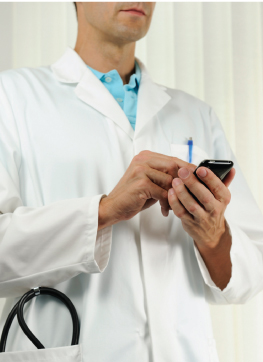There’s an app for that!
Recent years have seen an explosion of growth in the field of wireless medicine. New inventions include everything from digestible smart pills to implantable network devices to smart phone applications. Here’s a sampling of the ways wireless technology has revolutionized the way we now detect, diagnose, analyze, treat and monitor our health conditions.
Since its debut in the 1800s, the stethoscope has been a fundamental tool for assessing patient health. Over time, this simple instrument has been refined to improve sound quality. Newly introduced electronic stethoscopes offer even further enhanced audio, but that’s just the beginning. These instruments can record body sounds for later review and wirelessly deliver them to Bluetooth-enabled PCs. Some even feature software that automatically identifies suspected heart murmurs.
Another huge leap in 21st-century medicine is the wireless heart monitor. The 15-cm sensor, which can measure respiration rates, activity level and even the accumulation of body fluid, adheres to a patient’s chest and transmits data 24-7 to a server. That could mean fewer hospitalizations for at-risk patients since problems can be detected before they become symptomatic.
Meanwhile, as use of smart phones escalates, so does their potential for helping you monitor your own health. A company called Lifescan is poised to release an iPhone application that lets patients upload their glucose readings and wirelessly transmit the data to physicians and caregivers. “Wireless technology allows diabetics to track how different (factors) such as food and stress affect their body,” says E. Ann Myers, an endocrinologist at St. Mary’s Health Cntr. in San Francisco. “It also allows closer interaction between doctors and patients.” And while not every app can be called revolutionary, there are hundreds of mobile software programs that in some small way can help a user stay healthy. The product iTreadmill lets runners and walkers measure pace and distance. Allergy Alert provides up-to-date, location-specific information on pollen counts and air quality. Is That Gluten Free helps consumers quickly determine whether a particular product contains wheat, rye or barley.
Developers are also creating apps to help health care providers improve patient care. Medscape and Epocrates let doctors access a wealth of information without ever leaving the examination room. “I utilize this software daily,” says Myers. “It allows me to check drug interactions (and) pill dosages and even lets you know which drugs are approved by each insurance plan.”
What’s next? Hard to say. But what was 20th-century science fiction is quickly becoming a 21st-century reality.

Dawn Margolis Denberg has worked as a professional journalist for 20 years. Her work has appeared in top publications, including Wired, Shape and Parenting. She has also written several books for children including, The Men in Black Agent’s Manual The Official Godzilla Movie Fact Book. And, most recently, an episodic audio series for Tales Untold.


